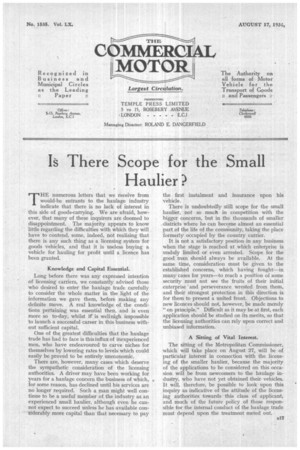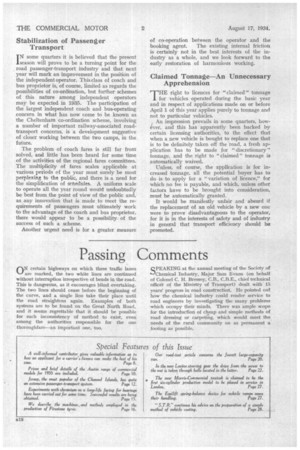I There Scope for the Small
Page 31

Page 32

If you've noticed an error in this article please click here to report it so we can fix it.
Haulier?
THE numerous letters that we receive from would-he entrants to the haulage industry indicate that there is no lack of interest in this side of goods-carrying. We are afraid, however, that many of these inquirers are doomed to disappointment. The majority appears to know little regarding the difficulties with which they will have to contend, some, indeed, not realizing that there is any such thing as a licensing system for goods vehicles, and that it is useless buying a vehicle for hauling for profit until a licence has been granted.
Knowledge and Capital Essential, Long before there was any expressed intention of licensing carriers, we constantly advised those who desired to enter the haulage trade carefully to consider the whole matter in the light of the information we gave them, before making any definite move. A real knowledge of the conditions pertaining was essential then, and is even more so to-day, whilst if is well nigh impossible to launch a successful career in this business without sufficient capital.
One of the greatest difficulties that the haulage trade has had to face is this influx of inexperienced men, who have endeavoured to carve niches for themselves by lowering rates to levels which could easily be proved to be entirely uneconomic.
There are, however, many cases which deserve the sympathetic consideration of the licensing authorities. A driver may have been working for years for a haulage concern the business of which, for some reason, has declined until his services are no longer required. Such a man might well continue to be a useful member of the industry as an experienced small haulier, although even he cannot expect to succeed unless he has available considerably more capital than that necessary to pay the first instalment and insurance upon his vehicle.
There is undoubtedly still scope for the small haulier, not so much in competition with the bigger concerns, but in the thousands of smaller districts where he can become almost an essential. part of the life of the community, taking the place formerly occupied by the country carrier.
It is not a satisfactory position in any business when the stage is reached at which enterprise is unduly limited or even arrested. Scope for the good man should always be available. At the same time, consideration must be given to the established concerns, which having fought—in many cases for years—to reach a position of some security must not see the fruits of their initial• enterprise 'and perseverance wrested from them, and their strongest protection in this direction is for them to present a united front. Objections to new licences should not, however, be made merely "on principle." Difficult as it may be at first, each application should be studied on its merits, so that the licensing authorities can rely upon correct and unbiased information.
A Sitting of Vital Interest.
The sitting of the Metropolitan Commissioner, which will take place on August 27, will be of particular interest in connection with the licensing of the smaller haulier, because the majority of the applications to be considered on this occasion will he from newcomers to the haulage in , dustry, who have not yet obtained their vehicles. It will, therefore, be possible to look upon this inquiry as indicative of the attitude of the licensing authorities towards this class of applicant, and much of the future policy of those responsible for the internal conduct of the haulage trade must depend upon the treatment meted out. Stabilization of Passenger Transport IN some quarters it is believed that the present season will prove to be a turning point for the road pa q.senger-transport industry and that next year will mark an improvement in the position of the independent operator. This class of coach and bus proprietor is, of course, limited as regards the possibilities of co-ordination, but further schemes of this nature among independent operators may be expected in 1935. The participation of the largest independent coach and bus-operating concern in what has now come to be known as the Cheltenham co-ordination scheme, involving a number of important railway-associated roadtransport concerns, is a development suggestive of closer working between the two camps, in the future.
The problem of coach fares is still far from solved, and little has been heard for some time of the activities of the regional fares committees. The multiplicity of fares scales applicable at various periods of the year must surely be most perplexing to the public, and there is a need for the simplification of smedules. A uniform scale to operate all the year round wontd undoubtedly be best from the point of view of the public and, as any innovation that is made to meet the requirements of passengers must ultimately work to the advantage of the coach and bus proprietor, there would appear to be a possibility, of the success of such a scheme.
Another urgent need is for a greater measure of co-operation between the operator and the booking agent. The existing internal friction is certainly not in the best interests of the industry as a whole, and we look forward to the early restoration of harmonious working.
Claimed Tonnage—An Unnecessary Apprehension
THE right to licences for "claimed" tonnage for vehicles operated during the basic year and in respect of applications made on or before April 1 of this year applies purely to tonnage and not to particular vehicles.
An impression prevails in some quarters, however, and this has apparently been backed by certain licensing authorities, to the effect that when a new, vehicle is bought to replace one that is to be definitely taken off the -road, a fresh application has to be made for " discretionary" tonnage, and the right to "claimed" tonnage is automatically waived.
Unless, of course, the application is for increased tonnage, all the potential buyer has to do is to apply for a "variation of licence," for which no fee is payable, and which, unless other factors have to be brought into consideration, must be automatically granted.
It would be manifestly unfair and absurd if the replacement of an old vehicle by a new one were to prove disadvantageous to the operator, for it is in the interests of safety and of industry in general that transport efficiency should be promoted.




























































































